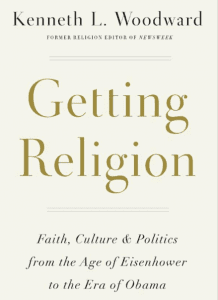So says  Kenneth Woodward in his new book, Getting Religion: Faith, Culture, and Politics from the Age of Eisenhower to the Era of Obama. Beginning with the occasionally-cited quip by Martin Marty — evangelicalism is “the religion you get when you get religion,” Woodward makes a case that evangelicalism is “essentially an entrepreneurial religion” (129).
Kenneth Woodward in his new book, Getting Religion: Faith, Culture, and Politics from the Age of Eisenhower to the Era of Obama. Beginning with the occasionally-cited quip by Martin Marty — evangelicalism is “the religion you get when you get religion,” Woodward makes a case that evangelicalism is “essentially an entrepreneurial religion” (129).
The genius, the energy, of Evangelicalism lies in its protean drive to fashion ever-new ministries and movements in order to segment and target new audiences as markets for spreading the Gospel and converting individuals to Christ. It is this entrepreneurial character that makes Evangelicalism an especially American form of Christianity, and helps explain the strong affinity between Evangelical Protestantism and free-enterprise capitalism, as manifest in the sudden rise in the late 1970s of the “New Religious Right” (130).
At times Woodward plays his hand and makes it clear he has an attitude about at least some of them, though he has respect for Billy Graham. But his big point is that evangelicalism is led by, sociologically speaking, charismatic entrepreneurs like Graham and Bill Bright.
Do you think it is accurate to call evangelicalism “entrepreneurial”? Do you think non-entrepreneurial evangelicalism is still evangelicalism? Is this “essential” to evangelicalism?
He speaks here of Bill Bright:
Whenever evangelists came calling, I told them they would have to pitch me over lunch—on them. I picked the restaurant, always a good one, and routinely ordered two lack Daniel’s as bracers while they talked. It was a taunt, I suppose, but I wanted them to know at least that much about where I stood. Bill Bright was a short, somber, rather unctuous undertaker kind of man whom I imagined as T. S. Eliot’s Eternal Footman sans the snicker (134).
After telling Bright of some in his family having an evangelical faith, we get this little one-upmanship:
“And you, did you follow in your father’s footsteps?” [Bright] asked. “Have you accepted Jesus Christ as your personal Lord and Savior?” In all the years I’d known him, [Billy] Graham had never asked me that. But Bright had slipped into witnessing mode and I thought I’d witness back.
“No,” I said. “I don’t want a personal Lord and Savior. I prefer the one everyone else has.” I’d been waiting for years to tell an evangelist that (134).
OK, Mr. Woodward, you made your point, but your point is a false dichotomy. Faith is both personal and corporate. The reason so many have flocked from the Catholic church to evangelicalism has much to do with the little point Woodward glowingly makes. (See my co-authored book Finding Faith, Losing Faith.)
Woodward knows some inner and at times dark secrets about evangelical leaders — like Billy Graham’s rather slippery move from staying out of partisan politics to private meetings designed somehow to stop the Catholic Kennedy from being elected or promoting Richard Nixon. Graham was well connected, well advised and built an empire with the Billy Graham Evangelistic Association. He respects Graham’s posture toward personal income even if Graham had more than an ample home in the mountains of Montreat NC. A telling conversation with Graham, who grew up Presbyterian but who joined the Southern Baptists in 1953 through a connection with WA Criswell at First Baptist in Dallas.
With this history in mind I asked Graham which church he now felt most comfortable in.
“Actually, Ken, I feel most at home in the evangelical wing of the Anglican Church,” Billy told me. On reflection, that made a certain sense. London was the site of his first overseas triumph, in 1954, and he always relished returning there. Besides, he admired scholarly Anglican clerics like John R. W Stott, who sustained the Church of England’s evangelical wing. But I also think that Billy secretly admired the stately Anglican ritual, and there was really only one basic ritual—the sermon and altar call—in Southern Baptist worship. That said, Billy always looked at home in his plain, business suit Baptist threads—and never more so than when photographed alongside the robed and mitered hierarchs of the Catholic, Orthodox, and Anglican churches (146-147).
Once watching Billy perform on a videotape along with Billy, Woodward asked Billy what he saw when he saw himself preach:
“I get so engrossed, I don’t think of the man on television as me,” Billy said. “I think of him as another person speaking because the spirit [sic] of God begins to speak to me through him” (149).
Woodward with Mark Hatfield, once again pressing his Catholicism into full view:
Months later, over lunch in the Senate dining room with Senator Mark Hatfield, a very serious and disciplined Baptist whose politics were markedly to the left of Graham’s, I recounted this story. I wanted his take.
“Ken,” he said, “if I didn’t know I was saved, I couldn’t get up in the morning.” “Mark,” I blurted out, “if I knew I was saved, I wouldn’t get up in the morning.” Such are the abiding differences between the spiritual sensibilities of Evangelicals and of Catholics (150). [Make that some Catholics, and some evangelicals.]
I’ve jawed here a bit with Woodward over his posture toward evangelicals, but I back down now to say this chapter is an exceptional reading of the highlights and realities of Billy Graham and how ambitious, driven, and passionate evangelicalism has been and can be. In that sense, Yes, evangelicalism is entrepreneurial. I feared he’d make it about money, but Woodward knows that can be a problem but that’s not the direction he takes it.











